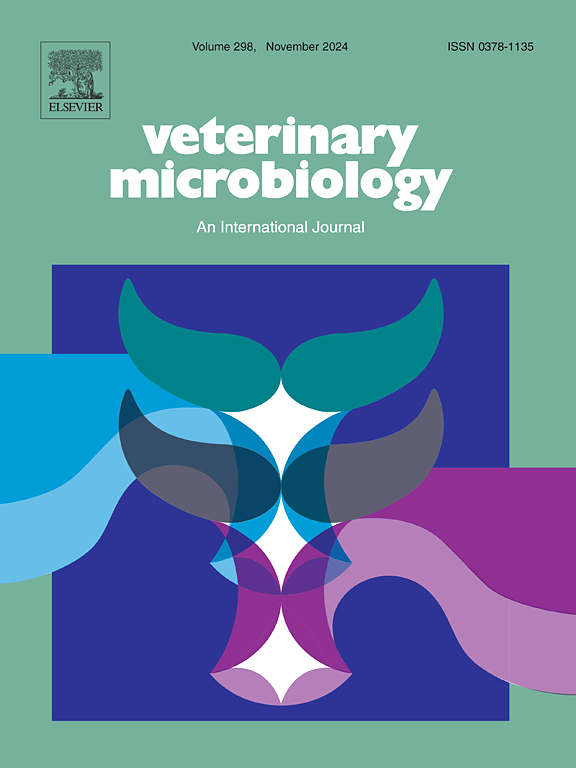IRF8通过下调IRF9促进牛短暂热病毒复制
IF 2.4
2区 农林科学
Q3 MICROBIOLOGY
引用次数: 0
摘要
干扰素调节因子8 (Interferon regulatory factor 8, IRF8)是IRFs蛋白家族的重要成员,在细胞因子信号转导、基因转录以及免疫细胞的分化和增殖中起着关键的转录调节作用。然而,其对牛短暂热病毒(BEFV)感染的作用尚未被描述。在本研究中,我们证明了BEFV感染上调IRF8的表达,IRF8促进BEFV的复制。随后的研究表明,在BEFV感染的情况下,IRF8通过IRF9的降解抑制I型IFN信号通路。在机制上,IRF8上调NEDD4 Like E3泛素连接酶(NEDD4L)的表达,从而通过泛素-蛋白酶体途径促进IRF9降解。值得注意的是,IRF8对BEFV介导的I型IFN信号通路的抑制作用明显减弱,在nedd4l敲低的细胞中,IRF8对BEFV复制的促进作用减弱,揭示了IRF8- nedd4l - irf9轴劫持I型干扰素信号通路促进BEFV感染的新机制。这些发现为了解IRF8的功能提供了有价值的见解,可以作为设计新型抗病毒药物的基础。本文章由计算机程序翻译,如有差异,请以英文原文为准。
IRF8 facilitates bovine ephemeral fever virus replication by downregulating IRF9
Interferon regulatory factor 8 (IRF8), an essential member of the IRFs protein family, serves as a critical transcriptional regulator in cytokine signaling, gene transcription, and the differentiation and proliferation of immune cells. However, its function on the bovine ephemeral fever virus (BEFV) infection has not been described. In this study, we demonstrate that BEFV infection upregulates the expression of IRF8, and IRF8 promotes the replication of BEFV. Subsequent investigations reveal that IRF8 suppresses the type I IFN signaling pathway via the degradation of IRF9 in the context of BEFV infection. Mechanistically, IRF8 up-regulates NEDD4 Like E3 ubiquitin ligase (NEDD4L) expression, thereby promoting the IRF9 degradation through the ubiquitin-proteasome pathway. Notably, the inhibitory effect of IRF8 on the BEFV-mediated type I IFN signaling pathway was markedly reduced, and the promoting effect of IRF8 on BEFV replication was attenuated in NEDD4L-knockdown cells, unveiling a novel mechanism by which IRF8-NEDD4L-IRF9 axis hijacks type I interferon signaling pathway to facilitate BEFV infection. These findings board valuable insights into the function of IRF8, which may serve as a basis for the design of novel antiviral agents.
求助全文
通过发布文献求助,成功后即可免费获取论文全文。
去求助
来源期刊

Veterinary microbiology
农林科学-兽医学
CiteScore
5.90
自引率
6.10%
发文量
221
审稿时长
52 days
期刊介绍:
Veterinary Microbiology is concerned with microbial (bacterial, fungal, viral) diseases of domesticated vertebrate animals (livestock, companion animals, fur-bearing animals, game, poultry, fish) that supply food, other useful products or companionship. In addition, Microbial diseases of wild animals living in captivity, or as members of the feral fauna will also be considered if the infections are of interest because of their interrelation with humans (zoonoses) and/or domestic animals. Studies of antimicrobial resistance are also included, provided that the results represent a substantial advance in knowledge. Authors are strongly encouraged to read - prior to submission - the Editorials (''Scope or cope'' and ''Scope or cope II'') published previously in the journal. The Editors reserve the right to suggest submission to another journal for those papers which they feel would be more appropriate for consideration by that journal.
Original research papers of high quality and novelty on aspects of control, host response, molecular biology, pathogenesis, prevention, and treatment of microbial diseases of animals are published. Papers dealing primarily with immunology, epidemiology, molecular biology and antiviral or microbial agents will only be considered if they demonstrate a clear impact on a disease. Papers focusing solely on diagnostic techniques (such as another PCR protocol or ELISA) will not be published - focus should be on a microorganism and not on a particular technique. Papers only reporting microbial sequences, transcriptomics data, or proteomics data will not be considered unless the results represent a substantial advance in knowledge.
Drug trial papers will be considered if they have general application or significance. Papers on the identification of microorganisms will also be considered, but detailed taxonomic studies do not fall within the scope of the journal. Case reports will not be published, unless they have general application or contain novel aspects. Papers of geographically limited interest, which repeat what had been established elsewhere will not be considered. The readership of the journal is global.
 求助内容:
求助内容: 应助结果提醒方式:
应助结果提醒方式:


